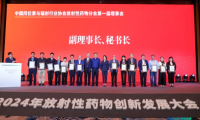-
Companies prepare for ADC trial readouts at ASCO 2024
- Source: drugdu
- 114
- May 17, 2024
-
BIO-THERA BAT1308 (PD-1) in combination with BAT8006 (ADC- FRα) approved for clinical trials in advanced solid tumors
- Source: drugdu
- 132
- May 14, 2024
-
Novartis Set to Acquire Mariana Oncology to Enhance Radioligand Therapy Pipeline
- Source: drugdu
- 118
- May 6, 2024
-
Focusing on China, Novartis Helps Promote the Development of the Radiopharmaceutical Industry
- Source: drugdu
- 86
- April 24, 2024
-
Enhertu Gets FDA Accelerated Approval for Unresectable, Metastatic HER2-Positive Solid Tumors
- Source: drugdu
- 128
- April 10, 2024
-
FDA Hands Expanded Indication to Gilead’s Vemlidy for Chronic HBV Infection in Pediatric Patients
- Source: drugdu
- 88
- April 2, 2024
-
BIO-THERA’s Phase II Clinical Trial Application for BAT8006 (ADC- FRα) for Injection Approved by US FDA
- Source: drugdu
- 129
- March 28, 2024
-
Hengrui Pharmaceuticals Clinical Trial Approved for Novel PARP Inhibitor HRS-1167 (M9466) Combination Therapy for Advanced Solid Tumors
- Source: drugdu
- 173
- March 18, 2024
-
Hengrui Medicine’s new “PARP inhibitor” HRS-1167 combination therapy for advanced solid tumors received clinical approval
- Source: drugdu
- 166
- March 15, 2024
your submission has already been received.
OK
Subscribe
Please enter a valid Email address!
Submit
The most relevant industry news & insight will be sent to you every two weeks.













